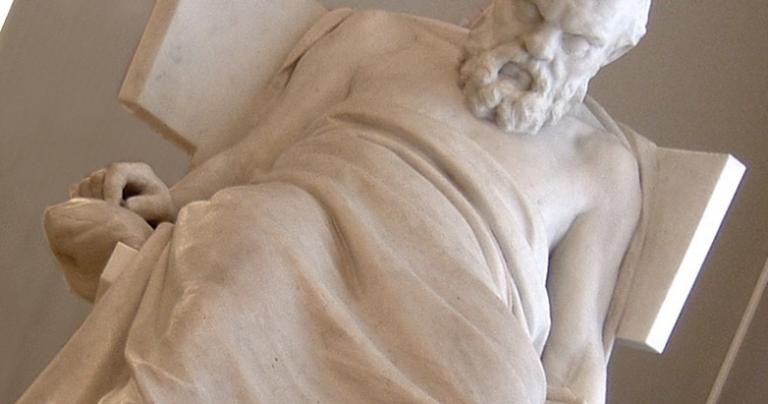 Asking a question begins a series of questions so endless that if it were not for the promise of Paradise where we can learn without end, a man might despair. There is glorious wonder in questions, but also a particular danger. To see the danger and the opportunity, I will outline how this Spring a question in a Saint Constantine college class led to a long discursive set of readings and what I learned, but also what I might not have learned.
Asking a question begins a series of questions so endless that if it were not for the promise of Paradise where we can learn without end, a man might despair. There is glorious wonder in questions, but also a particular danger. To see the danger and the opportunity, I will outline how this Spring a question in a Saint Constantine college class led to a long discursive set of readings and what I learned, but also what I might not have learned.
An Example in Wondering, What Might Have Gone Wrong: Early American White Racist Film and Novels
One question so easily leads to another . . .
Get interested in understanding why the film Birth of a Nation is so wretched and you can end up reading horrible novels by Baptist preacher and white supremicist Thomas Dixon. Wonder about the response and you have the much more enjoyable experience of finding Sutton E. Griggs and his brilliant anti-Dixon novel The Hindered Hand. During this reading, you see references to John Wilkes Booth, and so read a few biographies about a beautiful man turned to wickedness. Before you are done, you will realize you have to reread Uncle Tom’s Cabin.
The problem is that if a reader is not disciplined he will never answer the first question with any precision. Why is the film Birth of a Nation so wretched?
How do I know?
This is a description of a chain of some of my free time reading this spring and what motivated the book choices.
There is good here: one needs to collect data to understand a situation.
Some Data Collected, but a Danger Arises
Booth, the handsome actor turned killer, was a hero to some in the South, a status hidden by too many official histories that point to those better Southern leaders who understood what a disaster the assasination of Lincoln was. By hastening over support for Booth, his grave was oft visited and decorated with flowers, we miss something important about our reconstruction.Booth’s vision of Lincoln as tyrant is still taught in some schools.
Was it an accident that Booth was an actor and that so much Northern popular entertaiment at the time had a soft spot for the cause of the Confederate and traded in racialism?
Dixon as a novelist condemned Booth’s actions, but only because they hurt the cause of white nationalism. Dixon cared about the cause of white nationalism and wanted to make Lincoln over as an ally. Dixon understood that education is hard while edutainment is easier. Entertain and the “education” that might lead to questions, goes down easily. Dixon wrote fluently and with popular appeal and his racism is ugly and direct. To give one example, the only one I am willing to repeat, “kink” in the hair of a neighbor was, in a Dixon novel, an infallible sign of trouble and danger for white people. That such vile trash inspired an epic is worth pondering and deep reflection.
Standing against Dixon and his enablers were African-American intellectuals and allies. Sutton E. Griggs, an African American Baptist minister, understood the deep dangers of Dixon’s disgusting work, but also why it worked. Griggs produced his own counter-edutainment. Both Dixon and Griggs harkened back to the most successful edutainment vehicle in American history: Uncle Tom’s Cabin. Harriet Beecher Stowe made a war through the power of her novel and white slavers hated her.
Dixon imitated her down to character names in his twisted history of the Republic. He was the anti-Stowe, just as Griggs attempted to be (with less commercial success) the anti-Dixon.
The danger here is that I might start to edutain myself and never get back to the original question. If you are given to thinking, then all of these books are interesting. Before bringing my original question into focus, I was tempted to study American Baptists. Both Dixon and Griggs were Baptist ministers!
Stop.
I had to stop. I had to go back to the original question. When I did I discovered that it was a shoddy question, too open ended. This had led to a “feast of words” that threatened to turn into eating at one of those wretched all-you-can-eat buffets: fattening, but incoherent as a meal.
Fortunately, good teachers drilled the habit of stopping and reflecting into me. Data collection, reading, watching film, talking, is good, but can be endless, turning important issues into a hobby. Edutainment is a very dangerous tool that a just person must use with care. Does it encourage or discourage thought?
Was there a problem even with Stowe? Is this why Dixon, with an inferior book and a terrible set of ideas, prevailed in educating so much of America? Is edutainment, any amusement, always easier for the unjust man to use leaving a better educator like Griggs always playing at a disadvantage? These are better questions.
My original question had a too easy answer: Birth of a Nation is wretched, because of the corrupting ideas of white nationalism. Booth and Dixon showed how deep those roots were in entertainment. A better question is this: will entertainment and edutainment always favor causes that indulge the comfort and desires of the audience?
Is “be better” harder to write as spectacle, than “your vice is really a virtue?”
I suspect “know yourself” and “repent and sin no more” are not great for box office, while “here is who you are” and “they are not ok, but you are” go down better. Maybe.
I realized that Republic had (as usual) much to say about this idea.
Plato on Edutainment and Intellectual Gluttony
Socrates loved truth so much it got him killed, but he was also interesting. As a result, until he started attacking the sexual morals of Athens, the decadence of the rulers effectively, he was viewed as a splendid edutainer. At the start of the Republic, young men force Socrates to come to their home and do his “Socrates thing” in the downtime between shows at a festival they are all attending.
Socrates does discuss the idea of justice and some progress is made. Sadly, every time he begins to learn something, he loses his discussion partner for someone new. Edutainment demands novelty and so instead of answering the opening question, or persisting with Socrates, we get something different. Cephalus goes off to do his old man duties. Polemarchus lacks stamina and courage. When he is confronted, he shuts down. Finally, Thrasymachus keeps confusing a discussion with a debate. When he starts to lose, he shuts down.
Edutainment happens and the results might have been entertaining to watch, but Socrates realizes as education it was a failure. Why? He says:
It strikes me that I have been like a glutton, snatching at one dish after another and eating in such haste that I had no time to savor the food. I am afraid this is the way I have gone about our inquiry. We had not finished defining justice before I was off to examine whether it was the same as wisdom and virtue or ignorance and vice. Then I was unable to resist pursuing another line of inquiry into the comparative profitability of justice and injustice. So I must confess that the outcome of the discussion is that I know nothing. After all, if justice still remains undefined, I can hardly know whether it is in fact a virtue or a vice. Nor can I know whether the just man is in fact happy or miserable.
I suspect that much of what we market as “college” today is edutainment and at best encourages us to be gluttons. Socrates has given us the signs of gluttony:
We move with no depth or reflection from one idea to another. We are hasty.
We eat an intellectual meal with no menu, no theme.
We forget what we started to do: we do not answer first questions.
We are bored by careful reflection and have an aversion to precision.
The result of too much entertainment in our education is mental bloat. We have thought a great deal, have many inchoate opinions, some very good, but cannot act on them. Over the next few posts in this series, I will reflect for myself on Socrate’s warning and examine each danger of edutainment.
Then I will return to my better question: is edutainment useful or is it always a better tool for tyrants to tell us that what we wish to be true is true?
Meanwhile, if I have learned about the deep rooted nature of white supremacy in early American entertainment, I must apply that learning to today. Learning must produce action.
———————————————-
*I begin an informal summer reading of Republic using Scott/Sterling (a new translation for me). Part 1. Part 2. Part 3. Part 4. Part 5. Part 6. Part 7. Part 8. Part 9. Part 10. Part 11. Part 12. Part 13. Part 14. Part 15. Part 16. Part 17. Part 18. Part 19. Part 20. Part 21. Part 22. Part 23. Part 24. Part 25. Part 26. Part 27. Part 28. Part 29. Part 30. Part 31. Part 32. Part 33. Part 34. Part 35. Part 36. Part 37. Part 38. Part 39. Part 40. Part 41. Part 42. Part 43. Part 44. Part 45. Part 45.5. Part 46. Part 47. Part 48. Part 49. Part 50. Part 51.












